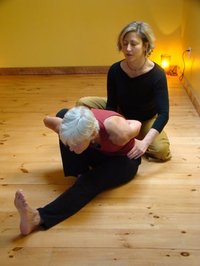Yoga therapy is a holistic form of alternative medicine that applies the entire science of yoga to effect health and healing on an individual basis. It addresses issues that confront people mentally, emotionally and spiritually, as well as physically, through a personalized engagement with the vast ancient system of wellbeing that is yoga.
People undertake yoga therapy for a variety of reasons: to rejuvenate their bodies, to feel less stress, to cultivate emotional balance, to calm their minds, and to become reacquainted with their inner soul nature. In whatever way one feels imbalanced yoga therapy can effect positive change by supplying tools to expand vitality and self-awareness. Like most holistic approaches, yoga therapy incorporates different treatment protocols for different people, even if the presenting issue or symptom is the same.
While standard yoga classes provide a more generalized approach to movement, and sometimes to meditation, "Yoga therapy adapts the practice of yoga to the needs of people with specific or persistent health problems not usually addressed in a group class," according to Larry Payne, Ph.D., director of the Yoga Therapy RX program at Loyola Marymount University.
As an overview, there are three general categories of yoga therapy, although they all interrelate. The first type is similar to physical therapy, using basic movements (Asana) to rehabilitate injury, moderate chronic pain or help someone regain functional energy. There are innumerable scientific studies that show evidence-based research on yoga's physical benefits.
The second aspect of yoga therapy is similar to psychotherapy, and uses mental and emotional principles and practices to help individuals deal with change, loss, anxiety and other internal struggles. Because emotional experiences have an effect on the physical body, this treatment correlates to psycho-neuroimmunology, a branch of psychology that studies the interaction between the nervous, endocrine and immune systems. It explains some of the subtleties of psychosomatic medicine and how the body reflects our internal state of thought and feeling.
The application of yogic techniques to affect specific changes in vital functioning of the body's organs and systems allows the individual to shift from unconscious response mode to chosen response in tense or challenging circumstances. An example would be the application of a breath exercise (pranayama) to balance and reset the parasympathetic nervous system's "fight or flight" response, thereby helping to combat anxiety or depression.
As the body and mind are interrelated, so are the first two categories of yoga therapy. Many physical symptoms are indicative of underlying emotional issues that need resolution. It has been said that "our biography becomes our biology" so yoga therapy offers relief on the physical level and inquiry on the psychological level. When the body's natural wisdom is accessed, emotional release occurs and healing begins at a deeper level.
The third aspect to yoga therapy addresses the spiritual component of our nature. Sacred texts of all spiritual paths and religions acknowledge that human beings have soul energy within. Yoga philosophy professes that the problems in our lives stem from our being in a state of unawareness, or ignorance (avidya) of our true spiritual nature. This translates as a feeling of being blocked or limited in some way. Similar to other forms of energy medicine like acupuncture, yoga therapy moves these energetic blockages by promoting the flow of vital life force energy (prana) to restore natural health and sense of purpose.
"I don't call people 'heart patients' or 'cancer patients,' I say that they are divine beings whose body happens to have a certain imbalance," says Nischala Joy Devi, author of The Healing Path of Yoga and developer of the yoga protocol for Dr. Dean Ornish's Program for Reversing Heart Disease in an interview with Yoga Therapy Today Magazine in 2013.
By offering the methodology to gain this true self-knowledge and become acquainted with our inner spirit, yoga therapy provides an opportunity to engage change at a profound level. It creates the ability to witness life experiences without becoming immersed in or identified with them. Calmness and mental stability are achieved through introspection combined with meditation, and the overstimulated mind can rest. Yoga Therapy opens the door for an expansion of consciousness that brings with it deep peace and unconditional love.
"Yoga therapy focuses on the path of yoga as a healing journey that brings balance to the body and mind through an experiential understanding of the primary intention of yoga: awakening of spirit, our essential nature," writes Joseph LePage, founder of Integrative Yoga Therapy.
The practices of yoga therapy provide comfort and relief to people of all ages and physical abilities. Because programs are individually tailored, no experience or particular capacities are needed. After an initial assessment is made of a client's needs, challenges and goals, the yoga therapist employs a wide range of mind-body practices, from postural alignments and breathing exercises, to relaxation strategies and meditation techniques. A personalized program is created to address any presenting condition, taking into consideration the client's level of physical ability and lifestyle for the type and amount of practices prescribed.
As a holistic, alternative treatment, yoga therapy can help people reduce symptoms, manage pain, restore balance, increase strength, improve emotional resiliency and expand spiritual awareness. It is a wonderful healing modality for those who want to integrate physical vitality, emotional freedom, and deep soul connection. To find a certified yoga therapist in your area, consult the website for the International Association of Yoga Therapists.
For more information about Jennie Lee's Yoga Therapy, please visit jennieleeyogatherapy.com or follow her on Facebook or Linked In
Photo Credit J. Wright
